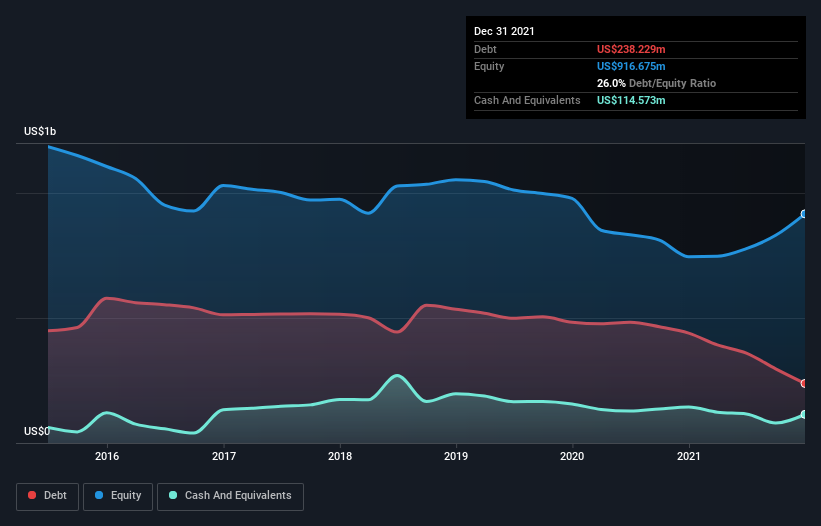- United States
- /
- Marine and Shipping
- /
- NYSE:GNK
Does Genco Shipping & Trading (NYSE:GNK) Have A Healthy Balance Sheet?

The external fund manager backed by Berkshire Hathaway's Charlie Munger, Li Lu, makes no bones about it when he says 'The biggest investment risk is not the volatility of prices, but whether you will suffer a permanent loss of capital.' So it might be obvious that you need to consider debt, when you think about how risky any given stock is, because too much debt can sink a company. We can see that Genco Shipping & Trading Limited (NYSE:GNK) does use debt in its business. But the real question is whether this debt is making the company risky.
What Risk Does Debt Bring?
Debt assists a business until the business has trouble paying it off, either with new capital or with free cash flow. Ultimately, if the company can't fulfill its legal obligations to repay debt, shareholders could walk away with nothing. However, a more common (but still painful) scenario is that it has to raise new equity capital at a low price, thus permanently diluting shareholders. Of course, plenty of companies use debt to fund growth, without any negative consequences. The first step when considering a company's debt levels is to consider its cash and debt together.
Check out our latest analysis for Genco Shipping & Trading
How Much Debt Does Genco Shipping & Trading Carry?
As you can see below, Genco Shipping & Trading had US$238.2m of debt at December 2021, down from US$439.6m a year prior. However, because it has a cash reserve of US$114.6m, its net debt is less, at about US$123.7m.

How Healthy Is Genco Shipping & Trading's Balance Sheet?
According to the last reported balance sheet, Genco Shipping & Trading had liabilities of US$41.9m due within 12 months, and liabilities of US$244.4m due beyond 12 months. On the other hand, it had cash of US$114.6m and US$22.5m worth of receivables due within a year. So its liabilities total US$149.3m more than the combination of its cash and short-term receivables.
Since publicly traded Genco Shipping & Trading shares are worth a total of US$969.2m, it seems unlikely that this level of liabilities would be a major threat. But there are sufficient liabilities that we would certainly recommend shareholders continue to monitor the balance sheet, going forward.
We use two main ratios to inform us about debt levels relative to earnings. The first is net debt divided by earnings before interest, tax, depreciation, and amortization (EBITDA), while the second is how many times its earnings before interest and tax (EBIT) covers its interest expense (or its interest cover, for short). The advantage of this approach is that we take into account both the absolute quantum of debt (with net debt to EBITDA) and the actual interest expenses associated with that debt (with its interest cover ratio).
Genco Shipping & Trading has a low net debt to EBITDA ratio of only 0.51. And its EBIT easily covers its interest expense, being 12.9 times the size. So we're pretty relaxed about its super-conservative use of debt. Even more impressive was the fact that Genco Shipping & Trading grew its EBIT by 2,532% over twelve months. That boost will make it even easier to pay down debt going forward. There's no doubt that we learn most about debt from the balance sheet. But ultimately the future profitability of the business will decide if Genco Shipping & Trading can strengthen its balance sheet over time. So if you want to see what the professionals think, you might find this free report on analyst profit forecasts to be interesting.
But our final consideration is also important, because a company cannot pay debt with paper profits; it needs cold hard cash. So we clearly need to look at whether that EBIT is leading to corresponding free cash flow. During the last two years, Genco Shipping & Trading produced sturdy free cash flow equating to 64% of its EBIT, about what we'd expect. This cold hard cash means it can reduce its debt when it wants to.
Our View
Genco Shipping & Trading's interest cover suggests it can handle its debt as easily as Cristiano Ronaldo could score a goal against an under 14's goalkeeper. And that's just the beginning of the good news since its EBIT growth rate is also very heartening. Looking at the bigger picture, we think Genco Shipping & Trading's use of debt seems quite reasonable and we're not concerned about it. While debt does bring risk, when used wisely it can also bring a higher return on equity. When analysing debt levels, the balance sheet is the obvious place to start. But ultimately, every company can contain risks that exist outside of the balance sheet. To that end, you should be aware of the 3 warning signs we've spotted with Genco Shipping & Trading .
If you're interested in investing in businesses that can grow profits without the burden of debt, then check out this free list of growing businesses that have net cash on the balance sheet.
New: Manage All Your Stock Portfolios in One Place
We've created the ultimate portfolio companion for stock investors, and it's free.
• Connect an unlimited number of Portfolios and see your total in one currency
• Be alerted to new Warning Signs or Risks via email or mobile
• Track the Fair Value of your stocks
Have feedback on this article? Concerned about the content? Get in touch with us directly. Alternatively, email editorial-team (at) simplywallst.com.
This article by Simply Wall St is general in nature. We provide commentary based on historical data and analyst forecasts only using an unbiased methodology and our articles are not intended to be financial advice. It does not constitute a recommendation to buy or sell any stock, and does not take account of your objectives, or your financial situation. We aim to bring you long-term focused analysis driven by fundamental data. Note that our analysis may not factor in the latest price-sensitive company announcements or qualitative material. Simply Wall St has no position in any stocks mentioned.
About NYSE:GNK
Genco Shipping & Trading
Engages in the ocean transportation of drybulk cargoes worldwide.
Excellent balance sheet with proven track record.
Similar Companies
Market Insights
Community Narratives



